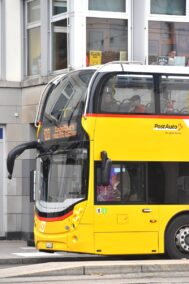How 5G Networks are Enhancing the Reliability of Smart Transportation Systems
The reliability of smart transportation systems is paramount for ensuring the safety, efficiency, and effectiveness of urban mobility. 5G networks, with their high bandwidth, low latency, and robust connectivity, are emerging as the backbone of these systems, revolutionizing the transportation landscape in cities like Riyadh and Dubai. The integration of 5G technology is not just a technological upgrade; it’s a fundamental shift in how we design, manage, and interact with transportation networks.
Ensuring Real-Time Communication and Data Exchange
One of the primary ways 5G networks improve the reliability of smart transportation systems is by enabling real-time communication and data exchange between various components. Connected vehicles, traffic sensors, infrastructure elements, and centralized management systems can seamlessly communicate with each other, exchanging critical information in milliseconds. This real-time data flow allows for immediate adjustments to traffic signals, rerouting of vehicles, and detection of potential hazards, significantly enhancing the responsiveness and adaptability of transportation systems.
Empowering Autonomous and Connected Vehicles
The rise of autonomous and connected vehicles (AVs and CVs) is heavily reliant on reliable, high-speed communication networks. 5G provides the necessary bandwidth and low latency to support the vast amounts of data these vehicles generate and consume. Real-time data exchange between AVs, CVs, and infrastructure allows for coordinated movements, optimized routing, and enhanced safety features such as collision avoidance systems. This level of connectivity and automation not only improves traffic flow but also reduces the risk of human error, making transportation systems more reliable and secure.
Resilience and Redundancy for Critical Infrastructure
5G networks are designed with resilience and redundancy in mind, ensuring continuous operation even in the face of disruptions or failures. This is crucial for smart transportation systems, as any downtime can have significant consequences for traffic flow, safety, and public services. The ability of 5G networks to dynamically reroute traffic and provide backup connectivity ensures that critical transportation infrastructure remains operational even during emergencies or natural disasters. This level of resilience is essential for building trust in smart transportation systems and ensuring their long-term viability.
Optimizing Public Transportation with Real-Time Information
5G is also transforming public transportation by providing real-time information to both operators and passengers. Transit authorities can monitor the location and status of buses, trains, and trams in real time, allowing for better scheduling, route optimization, and efficient dispatching of vehicles. Passengers can access real-time arrival and departure information through mobile apps, reducing wait times and improving the overall travel experience. The integration of 5G with smart ticketing systems and digital payment platforms further enhances the convenience and accessibility of public transportation.
A Catalyst for Innovation in Transportation
The reliability of 5G networks is not only improving existing transportation systems but also driving innovation in the sector. With the advent of 5G, new possibilities are emerging, such as smart parking systems that guide drivers to available parking spots, intelligent traffic management systems that learn and adapt to changing traffic patterns, and integrated mobility platforms that offer seamless transitions between different modes of transportation. The combination of 5G with other emerging technologies, such as artificial intelligence and machine learning, is further accelerating the development of innovative solutions that can address the complex challenges of urban mobility.
5G-Powered Transportation: A Vision for the Future
The cities of Saudi Arabia and the UAE are at the forefront of embracing 5G technology for smart transportation. The ambitious projects and initiatives in these countries, such as the development of Neom in Saudi Arabia and the Dubai 2040 Urban Master Plan, highlight the importance of 5G-enabled transportation systems in creating sustainable, efficient, and technologically advanced urban environments. The investment in 5G infrastructure and the commitment to innovation in these countries are paving the way for a future where transportation is seamlessly integrated, intelligent, and reliable, ultimately improving the quality of life for residents and visitors alike.
#5G #SmartTransportation #Reliability #ConnectedVehicles #UrbanMobility























